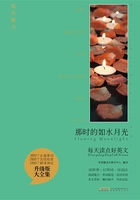
快乐谷 The Happy Valley
[英国]塞缪尔·约翰逊/Samuel Johnson
塞缪尔·约翰逊(1709-1784),英国词典编纂家、散文家和文学评论家。一生穷困潦倒,直到历时九载编纂完成《英语词典》,才声名大振。他才学广博,言谈睿智。诗歌代表作《人类欲望的虚妄》反映了他对人生的独到见解,传记《英国诗人传》坚持以事实作传,把英语传记文学推向更高的水平。
“What,”said he,“makes the difference between man and all the rest of the animal creation?Every beast that strays beside me has the same corporal necessities with myself, he is hungry, and crops the grass, he is thirsty, and drinks the stream, his thirst and hunger are appeased, he is satisfied and sleeps;he rises again and he is hungry, he is again fed and is at rest. I am hungry and thirsty like him, but when thirst and hunger cease I am not at rest;I am, like him, pained with want, but am not, like him, satisfied with fullness. The intermediate hours are tedious and gloomy;I long again to be hungry that I may again quicken my attention. The birds peck the berries or the corn, and fly away to the groves where they sit in seeming happiness on the branches, and waste their lives in tuning one unvaried series of sounds. I likewise can call the lutanist and the singer, but the sounds that pleased me yesterday weary me today, and will grow yet more wearisome tomorrow. I can discover within me no power of perception which is not glutted with its proper pleasure, yet I do not feel myself delighted. Man has surely some latent sense for which this place affords no gratification, or he has some desires distinct from sense which must be satisfied before he can be happy.”
他说:“人和动物的区别在哪里?在我身旁游走的每个野兽,和我一样都有肉体上的需要:饿了吃草,渴了喝溪水,充饥解渴后将满足地睡去;醒来又饿了,再吃饱休息。我和他一样也会饥渴,但不渴也不饿时,我不休息;我也像他一样因需求匮乏而痛苦,但不像他因需求丰裕而满足。中间这个阶段,冗长而又乏味;我又开始渴望饥饿,好再次加速自己的注意。鸟儿啄食着浆果或谷物,好像非常快乐地飞到树丛中,停靠在树枝上,并且百无聊赖地吟唱着一成不变的曲调。同样地,我也能叫来诗琴弹奏者和歌手,但昨天还能使我愉悦的乐章,今天却令我厌烦,明天变得更令人厌倦。我从自身发现,没有一种感受力不是被适度愉悦充满的,但是我不觉得自己快乐。确实,人类有某种潜在的感觉,会告知自己这个地方不能令人愉悦,或者,在快乐之前,他有一些有别于感觉的渴望,必须先得到满足。”